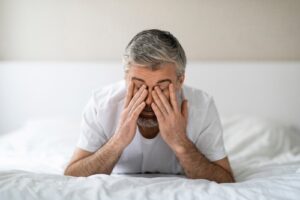As we age, our sleep patterns often undergo significant changes, which can affect our overall health and quality of life. Many older adults find it increasingly challenging to maintain a consistent sleep schedule. Understanding these changes and learning how to manage them can help us sleep and feel better as we age. If you or your elderly loved one are in Westwood, professionals from in-home care can help you apply these tips more easily. Let’s explore how aging affects sleep patterns and learn some practical advice for managing these changes.
How does aging affect sleep patterns?

Aging brings about a variety of physiological changes that can significantly impact sleep architecture. Sleep architecture is the structure of sleep cycles including deep sleep, light sleep, and REM sleep. One of the most notable changes is the production of certain hormones like melatonin, which helps regulate sleep. Older adults often experience a decrease in melatonin levels, which can make it more difficult for them to fall asleep and stay asleep.
Furthermore, the internal body clock, or circadian rhythm, tends to shift earlier in older adults. This shift can lead to a phenomenon known as “advanced sleep phase syndrome,” where people feel sleepy earlier in the evening and wake up unusually early in the morning. While these changes might be subtle at first, over time they can affect the quantity and quality of sleep very negatively.
The structure of sleep also changes with age. Older adults spend less time in deep, restorative sleep stages and more time in the lighter stages of sleep. This makes it more likely for the person to wake up unrefreshed and feel drowsy throughout the day. Also, medical conditions that are more common in older age, such as arthritis, back pain, and cardiac issues, as well as the medications used to treat them, can also negatively impact sleep quality.
How can I sleep better as I age?
Improving sleep in later years requires both lifestyle adjustments and a proactive approach to managing health conditions that may interfere with sleep. Here are some effective strategies:
- Maintain a regular sleep schedule: Going to bed and waking up at the same time each day can significantly improve the quality of your sleep. This regularity helps reinforce your body’s sleep-wake cycle.
- Create a relaxing bedtime routine: Do some calming activities before bed, such as reading, listening to soft music, or deep breathing and meditation. Avoid stimulating activities such as watching TV or using your phone.
- Optimize your sleep environment: Make sure your bedroom is all set up for a good night’s sleep. Keep it dark, quiet, and cool, and invest in a comfortable mattress and pillows. You can use blackout curtains and sound machines if light and noise bother you.
- Watch your diet: Avoid large meals, caffeine, and alcohol before bedtime, as they can disrupt sleep. Instead, opt for a light snack if you’re hungry, such as yogurt or a small bowl of cereal. Staying hydrated throughout the day and eating nutritious meals is the key.
- Stay physically active: Regular physical activity can help you fall asleep faster and enjoy deeper sleep. However, timing is important. Exercise stimulates the body and doing it too close to bedtime can make it harder to fall asleep.
- Manage health issues: Address any pain or medical conditions with your healthcare provider, as they can significantly impact sleep quality. If you properly manage the medication for your cardiovascular and other conditions, sleep will be much easier.
Where in Westwood can I find reliable in-home care?

Sleep issues can be complex, especially when combined with other age-related changes. A Better Way In Home Care is here to support older adults by connecting them with experienced and dedicated caregivers. The professionals we connect you with can assist with establishing a nighttime routine, creating a safe and comfortable sleep environment, and providing companionship that eases the anxiety and loneliness that can often interfere with sleep.
From the homes around Hammer Museum to other parts of Westwood, the professionals in our database cover a wide range of areas. Let us help you. Contact us today to learn more!








